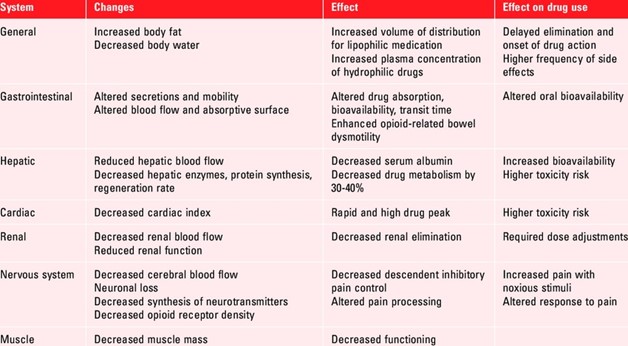A nurse is contributing to the plan of care for an older adult client. Which of the following physiological changes should the nurse recommend considering when administering medication?
Increased liver function
Increased metabolism
Decreased pulmonary function
Decreased kidney function
The Correct Answer is D
As individuals age, there is a natural decline in kidney function. This can result in a reduced ability to filter and excrete medications and their metabolites from the body. The decreased kidney function can lead to a longer half-life of medications, increased drug accumulation, and an increased risk of adverse drug reactions. It is important for the nurse to adjust medication dosages and frequencies based on the individual's renal function to prevent drug toxicity.
Increased liver function: Aging is associated with a gradual decline in liver function. While there may be some individual variations, in general, liver function decreases rather than increases with age. However, changes in liver function can affect the metabolism and elimination of medications. Some medications may require dosage adjustments based on liver function, but it is not a common physiological change in older adults.
Increased metabolism: Aging is generally associated with a decrease in metabolism rather than an increase. The metabolic rate tends to slow down with age, which can affect the pharmacokinetics of medications. Slower metabolism can result in medications taking longer to be metabolized and cleared from the body, potentially leading to prolonged drug effects.

Nursing Test Bank
Naxlex Comprehensive Predictor Exams
Related Questions
Correct Answer is B
Explanation
b. "You feel upset by the responses of others."
The appropriate response by the nurse is to acknowledge and validate the client's feelings. Option b, "You feel upset by the responses of others," demonstrates empathy and reflects back the client's feelings, indicating that the nurse understands and acknowledges the client's distress.
Explanation for the other options:
a. "I think you should just ignore the others." This response dismisses the client's concerns and does not address the underlying issue of the client feeling hurt by the interactions with others. It is important for the nurse to address the client's feelings and provide support.
c. "Let's keep the focus of our discussion on your needs." While it is important to address the client's needs, it is also necessary to address the client's concerns and feelings related to the interactions with other clients. Ignoring or dismissing the client's concerns can further isolate the client and hinder their progress in the therapeutic environment.
d. "Everything will get beter once you get to know everyone." This response minimizes the client's feelings and does not provide immediate support or address the client's concerns. It is essential for the nurse to validate the client's emotions and explore strategies to address the issue of others making fun of the client.
In summary, the nurse should choose a response that acknowledges the client's feelings and demonstrates empathy. Validating the client's experience can help establish trust and provide a foundation for further therapeutic interventions.
Correct Answer is A
No explanation
Whether you are a student looking to ace your exams or a practicing nurse seeking to enhance your expertise , our nursing education contents will empower you with the confidence and competence to make a difference in the lives of patients and become a respected leader in the healthcare field.
Visit Naxlex, invest in your future and unlock endless possibilities with our unparalleled nursing education contents today
Report Wrong Answer on the Current Question
Do you disagree with the answer? If yes, what is your expected answer? Explain.
Kindly be descriptive with the issue you are facing.
